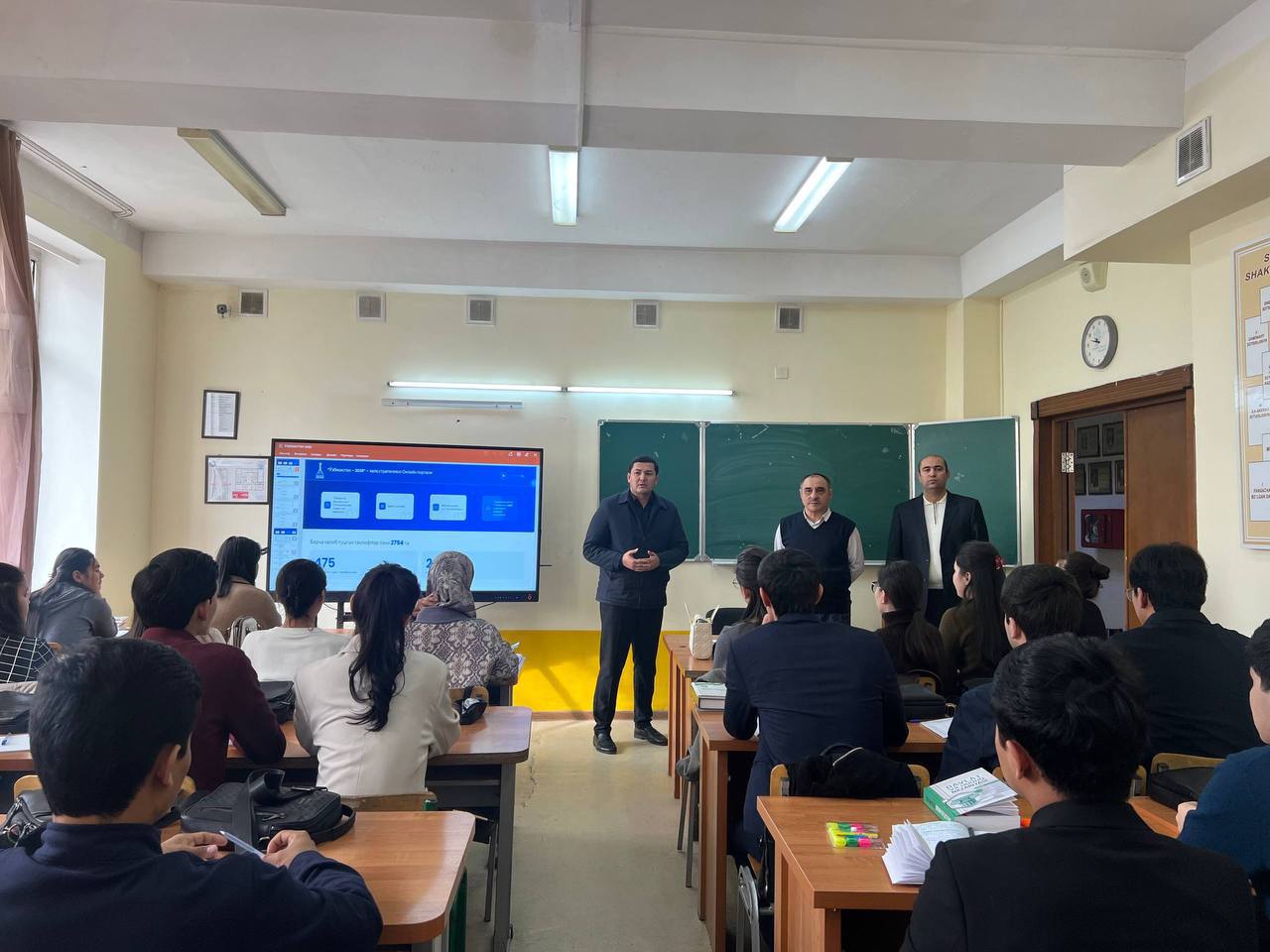
Normurodova Qunduz – Head of department
100174, Universitet street 4, Olmazor district, Tashkent
Monday-Friday, 14:00 – 17:00
+998 71 227-15-44
e-mail: normurodovak@gmail.com
Detailed information about the history and main activities of the department and its head.
The history of the Department of Microbiology and Biotechnology begins from 1938, with the foundation of the Department of “Non-vascular plants” by academician I.A. Raikova at Tashkent State University.
Since 1940, the department was headed by prof. P. Golovin and from this period the training of specialists in the field of mycology began.
In 1956, on the initiative of Associate Professor O.G. Elkina, the Department of Microbiology was founded on the basis of the Department of Non-vascular plants and specialists such as K.Y. Musaev, F.G. Akhmedova, K.I. Ibodov were trained in this direction.
Since 1990, the Department of Microbiology has been headed by Prof. A.H. Vakhabov.
In 1989, Prof. M.M. Rakhimov founded the Department of Biotechnology and began training specialists in this field.
In 2005, two separate departments “Microbiology” and “Biotechnology” were merged into a single department, chaired by prof. M.M. Rakhimov.
Over its 70-year history, the Department of Microbiology and Biotechnology has trained highly qualified specialists in the field of microbiology and biotechnology not only for Uzbekistan, but also for Tajikistan, Kyrgyzstan, Turkmenistan, Kazakhstan, the Russian Federation, China, Norway, Korea, Egypt, Iraq, Cuba, Germany and the USA. Professors and lecturers of the Department of Microbiology and Biotechnology are regularly sent to prestigious universities in a number of foreign countries for advanced training.
Former students of the Department of Microbiology and Biotechnology are currently leading scientists, doctors of Sciences, professors, academicians who contribute to the development of microbiology and biotechnology in Uzbekistan and abroad.
Among the graduates of the Department of Microbiology and Biotechnology are state and public figures, a deputy of the Oliy Majlis, heads of scientific institutes and scientists of the country. Minister of Innovative Development of the Republic of Uzbekistan I.Y. Abdurakhmanov and his deputy Sh.U. Turdikulova, Rector of Ajou University in Tashkent, G.A. Muratov are also graduates of the department. In addition, graduates of the department are currently working at the Universities of California and New York in the USA, the Russian Agrarian University and the Pedagogical Institute of the Republic of Kazakhstan.
The department teaches undergraduate students in the subjects of microbiology and virology, biotechnology, medical microbiology, lower plants.
At the master’s stage, students are offered two programs: microbiology and virology, biotechnology.
Masters in microbiology and virology are taught subjects such as molecular microbiology, industrial microbiology, molecular biology of viruses, biology of fungi, systematics and cytology of microorganisms, soil microbiology, applied mycology and viral diseases of plants.
The following subjects are taught to students of the Master’s degree in biotechnology: molecular biotechnology, applied enzymology, biotechnology of biologically active and medicinal substances, fundamentals of biological specificity, biotechnology and environmental problems, immunobiotechnology, nanobiotechnology, affinity chromatography.
Today, the Department of Microbiology and Biotechnology cooperates with the Institute of Microbiology, the Institute of Biochemistry and Biophysics, the Institute of Plant Chemistry, the Institute of Genetics and Experimental Biology of the Academy of Sciences of the Republic of Uzbekistan, as well as the Center for Genomics and Bioinformatics and the Center for Advanced Technologies under the Ministry of Innovative Development of the Republic of Uzbekistan.
Professor M.M. Rakhimov for the first time created a scientific school of biotechnology, whose followers pass on their knowledge and experience to their students. And also, Professor A.H. Vakhabov contributed to the development of microbiology and virology at the faculty.
Since 2021, the Department of Microbiology and Biotechnology has been headed by Doctor of Biological Sciences, Associate Professor Normuradova Kunduz Togaevna. In 2019, K.T. Normuradova successfully defended her dissertation for the degree of Doctor of Biological Sciences (DSc) on the topic “Improving the biotechnology of ethanol production from starch-containing raw materials” under the supervision of Prof. G.A. Muratov. According to the results of scientific research K.T. Normuradova has published more than 75 scientific papers, including 45 scientific articles in prestigious journals of the republic, published more than 30 abstracts and articles at international and republican scientific conferences.
The disciplines taught at the department are special for Bachelor’s and Master’s degrees
| № | Name of subjects | Brief information about the subject |
| 1 | Microbiology and virology | The purpose of teaching science is to teach students the morphology of prokaryotes and viruses, cell structure, reproduction, their distribution in nature, the influence of various factors, the theoretical foundations of knowledge about the importance of human life, the basic concepts and sections of microbiology and virology, in order to teach and develop the ability to use them in practice. |
| 2 | Biotechnology | The science of “Biotechnology” is based on a set of biological processes and biosystems involving living organisms on an industrial scale and the creation of genetically modified products and organisms, genetic modification, the development of rapid methods for obtaining agricultural biopreparates and immunostimulants, and their use for the destruction of viruses and bacteria, and teaches methods for their detection. |
| 3 | Medical Microbiology | The science of “Medical Microbiology” introduces the causes and symptoms of diseases caused by microorganisms in humans, the features of their pathogens and pathogenesis, and the main methods for detecting infectious diseases. |
| 4 | Molecular Microbiology | The aim of the course is to develop knowledge, skills and competencies in the field of molecular identification of microorganisms, separation of nucleic acids from microbial cells, mutagenesis in microorganisms, polymerase-chain reactions, gel filtration methods, molecular cloning and DNA sequencing. |
| 5 | Molecular Microbiology of viruses | Purpose of teaching science is to get acquainted with the role of viruses in the taxonomy of living organisms, with the structure of viruses, and the use of molecular biology. modern methods for explaining the relationship between viruses and cells. |
| 6 | Industrial microbiology | The purpose of teaching this discipline is the creation and use of new technological processes based on microorganisms, familiarization with the basics of the theory of microbial technology. |
| 7 | Molecular biotechnology | The purpose of teaching this discipline is the structure of genes and genomes, different vectors, the creation of transgenic organisms, molecular cloning and DNA sequencing, familiarization with the basics of molecular diagnostics. |
| 8 | Applied Enzymology | This discipline combines the analysis of various biotechnological processes, wastewater treatment, creation of biotechnological processes for processing organic waste, and familiarization with the basics of microbial enzymes. |
| 9 | Biotechnology of biologically active and medicinal substances | The purpose of teaching the discipline is to study the achievements of biotechnology of biologically active and medicinal substances and their significance in the national economy, the main concepts of studying biologically active and medicinal substances and the development of the ability to apply them in practice. |
Researchers and fields of their research interest
| № | Full name | Academic degree, title | Thesis topic |
| 1 | Normuradova Kunduz Togaevna | Doctor of Biological Sciences, Associate Professor | Improvement of biotechnology for ethanol production from starch-containing raw materials |
| 2 | VakhabovAbdurasul Khakimovich | Doctor of Biological Sciences, Professor | Characteristics of the most common phytoviruses in the ecological environment of Uzbekistan |
| 3 | Tashmukhamedova Shohista Sobirovna | Doctor of Biological Sciences, Professor | Identification of bacterial and viral antigens by modern methods |
| 4 | Shurygin Vyacheslav Vladimirovich | Doctor of Biological Sciences, Associate Professor | The role of rhizospheric microorganisms in stimulating the growth and development of chickpeas and biological control of its root diseases under salinization conditions |
| 5 | Kadirova Zukhra Ahrorovna | PhD in Biology | Creation of a virus-free medicinal plant Physalis Alkekengi by micropropagation and obtaining biologically active substances. |
The Members of the Department
| # | Full name | |
| 1 | Normurоdova Kunduz Togaevna | normurodovak@gmail.com |
| 2 | VakhabovAbdurasul Khakimovich | vaxabov@gmail.com |
| 3 | Tashmukhamedova Shokhista Sabirovna | shokhista.tashmukhamedova@gmail.com |
| 4 | Shurygin Vyacheslav Vladimirovich | slaventus87@inbox.ru |
| 5 | Kadirova Zukhra Ahrorovna | zukhra_abrarovna7@mail.ru |
| 6 | Abdusamatov Sokhibjong Abdusamatovich | sokhibjon.abdusamatov@gmail.com |
Scientific laboratories
In 2020, a joint Uzbek-Chinese Research Laboratory “Ecobiome” (https://ecobiomeuz.com/) was founded at the Department of “Microbiology and Biotechnology” of the Faculty Biology.
Students clubs
At the Department of Microbiology and Biotechnology operates the “Young Biotechnologists and Microbiologists” students club. It is designed to improve the quality and level of students’ assimilation of scientific and educational material, promote intellectual, cultural and spiritual development of students, as well as improve the organization and quality of their leisure time. It is also intended for conducting research in the field of microbiology and biotechnology.

